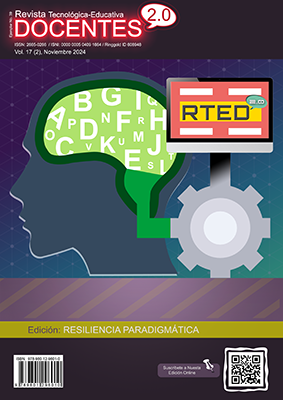The Environmental Education to Transform Student Behavior from the Classroom
 DOI:
https://doi.org/10.37843/rted.v17i2.551
DOI:
https://doi.org/10.37843/rted.v17i2.551
Main Article Content
Abstract
Environmental education is a contemporary topic that has had the gaze of important leaders and researchers to achieve the mitigation of various environmental problems. The trial's objective was to comparatively analyze the receptivity of environmental education received by high school students in two public schools in Colombia. It is framed under the inductive method in the humanistic paradigm, with a mixed, interpretive approach and topical narrative design. It deploys a critical analysis of the knowledge and environmental behavior of students who have received environmental education and those who have yet to. It concludes with the paradox between the theoretical education received by students in the classroom and the environmental behaviors defined by the students' habits manifested in their daily lives, proposing the implementation of pedagogical strategies from the emotionality of the young person to transcend environmental education toward the student's behavior.
Downloads
Metrics
Article Details

This work is licensed under a Creative Commons Attribution-NonCommercial-NoDerivatives 4.0 International License.
Those authors who have publications in our journal accept the following terms:
- When a work is accepted for publication, the author retains rights of reproduction, distribution of his/her article for exploitation in all countries of the world in the format provided by our magazine and any other magnetic medium, optical, and digital.
- Authors will retain their copyright and guarantee the journal the right first to publish their work, which will be simultaneously subject to the Creative Commons Acknowledgment License (Attribution-NonCommercial-NoDerivatives 4.0 International (CC BY-NC-ND 4.0)). That allows third parties to copy and redistribute the material in any medium or format, under the following conditions: Acknowledgment - You must properly acknowledge authorship, provide a link to the license, and indicate if any changes have been made. You may do so in any reasonable way, but not in a way that suggests you have the licensor's endorsement or receive it for your use. NonCommercial - You may not use the material for a commercial purpose. NoDerivatives - If you remix, transform, or build from the material, you cannot broadcast the modified material. There are no additional restrictions - You cannot apply legal terms or technological measures that legally restrict you from doing what the license allows.
- Authors may adopt other non-exclusive license agreements to distribute the published version of the work (e.g., deposit it in an institutional archive or publish it in a monographic volume) provided that the initial publication in this journal is indicated.
- Authors are allowed and recommended to disseminate their work through the Internet (e.g., in institutional telematic archives, repositories, libraries, or their website), producing exciting exchanges and increasing the published work's citations.
- Request of withdrawal an article has to be done in writing by the author to the Editor, becoming effective after a written response from the Editor. For this purpose, the author or authors will send correspondence via e-mail: [email protected].
- The author will not receive financial compensation for the publication of his work.
- All Docentes 2.0 Journal publications are under the Open Journal System (OJS) platform at: https://ojs.docentes20.com/.
References
Acebal, M. (2010). Conciencia ambiental y formación de maestras y maestros. [Tesis
de Doctorado] Universidad de Málaga. http://riuma.uma.es/
Arendt, H. (1996). Entre el pasado y el futuro. Ocho ejercicios sobre reflexión política.
Ediciones Península.
Cataldo, H. (2016). ¿Es posible desligar la educación del mercado? Politizar la educación. Cuestiones de filosofía, 1(17), 55-64. https://doi.org/10.19053/01235095.4287 DOI: https://doi.org/10.19053/01235095.4287
Giroux, H. A. (2003). La Inocencia Robada. Juventud, Multinacionales y Política Cultural. Ediciones Morata.
Guitrón, R. (2020). La Filosofía Ambiental en la Perspectiva Antropoética Ontoepistemológica de Enrique Leff. Universidad Pontificia Comillas y Universidad Ramón Llull. Madrid.
Marcuse, H. (1971). Industrialización y capitalismo. Editado por Otto Stammer. Oxford.
Leff, E. (2006). Aventuras de la Epistemología Ambiental: de la articulación de ciencias al diálogo de saberes. Siglo XXI Editores. https://n9.cl/kt570
Márquez Delgado, D. L., Hernández Santoyo, A., Márquez Delgado, L. H., & Casas Vilardell, M. (2021). La educación ambiental: evolución conceptual y metodológica hacia los objetivos del desarrollo sostenible. Revista Universidad y Sociedad, 13(2), 301-310. https://n9.cl/pkgnf
Mascarell, C. (2017). Formación de los estudiantes de secundaria en educación ambiental. [Tesis de Doctorado] Universidad Católica de Valencia. https://n9.cl/xx873
Navarro, R., & Ramírez, M. (2015). Construyendo el Significado del Cuidado Ambiental: Un Estudio de Caso en Educación Secundaria. REICE. Revista Iberoamericana Sobre Calidad, Eficacia Y Cambio En Educación, 4(1). https://revistas.uam.es/reice/article/view/10071
Rosalyn, M. (2002). Manual de educación para el desarrollo sostenible. Centro de Energía, Medio Ambiente y Recursos. Universidad de Tennessee. https://n9.cl/2aeoi
Sánchez, N. (2018). Práxis Pedagógica en Clave del Pensamiento Ambiental Complejo-Sur. Universidad Simón Bolivar, Colombia. https://n9.cl/i7rgj
Sosa, S., Isaac-Márquez, R., Eastmond, A., Ayala, M., & Arteaga, M. (2010). Educación superior y cultura ambiental en el sureste de México. Universidad y Ciencia, 26(1), 33-49.
Valbuena, J. (2010). Cómo generar una cultura ecológica-ambiental cívica y ética en nuestro contador público para que lidere proceso de cambio en el control y gestión ambiental, Revista científica de contabilidad. Apuntes Contables. Universidad Externado de Colombia.






